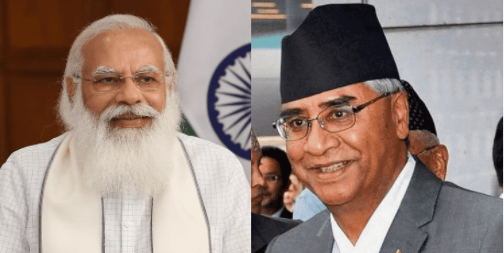KP Sharma Oli and his turbulent reign had come to an end in Nepal in July this year. A five-member Constitutional Bench of the Supreme Court had directed Nepali Congress President Sher Bahadur Deuba to take charge as the country’s Prime Minister. A day later, Nepal got a pro-India Prime Minister. As Prime Minister, Sher Bahadur Deuba has taken multiple steps to ensure that ties between Nepal and India do not go from bad to worse. Most recently, Deuba warned Nepalese citizens against carrying out agitations and demonstrations against India and Prime Minister Narendra Modi.
The directive comes in the backdrop of some student wings of the ruling and opposition parties in Nepal holding protests against the Indian government over the past few days.
On Sunday, Nepal’s Ministry of Home Affairs warned protesters not to burn the effigy of the Prime Minister of the “neighbouring country”.
In a statement, Nepal’s Home Ministry said “the activities of chanting slogans, holding demonstrations and protest and burning effigies to tarnish the image of the neighbouring friendly nation’s Prime Minister has caught” its attention.
It further described such acts as “reprehensible and disgraceful”. The Home Ministry statement added, “The Government of Nepal wishes to have a friendly relationship with all friendly nations and is determined not to let any activities that may harm the national interest. We request everyone not to carry out any action that may hurt the dignity and respect of the friendly nations.”
The new Nepalese government has also warned demonstrators of strict action in case they do not stop their activities targeted against the friendly neighbouring nation, and will punish those who involve themselves in the “unlawful activities”.
What Led to Protests Against India?
At least two different diplomatic rows have occurred between Kathmandu and New Delhi over the past two months. After the swearing-in of a pro-India Prime Minister in Nepal, it seems China has been trying to stoke troubles in ties between India and Nepal. In late July, a Nepalese citizen named Jaya Singh Dhami, 33, of Byas rural municipality in Darchula district is said to have jumped into the river from the carriage of the tuin (a makeshift ropeway with a box attached for seating) he was clinging to. Nepal has accused India’s Sashastra Seema Bal (SSB) of being witnesses to the incident. According to the Indian Express, however, officials in India said the man was crossing over to the Indian side “illegally” using the tuin.
In another, more recent incident, Nepal accused India of violating its airspace. It said an Indian helicopter repeatedly breached the Nepali territory and made a flight over western Nepal of Darchula district.
Timing of Protests Raises Suspicions
The protests against India in Nepal come at a time when Nepal’s new Prime Minister, Sher Bahadur Deuba has formed a five-member committee to analyse its border dispute with China in Nepal’s Humla district. Under former Prime Minister KP Sharma Oli’s tenure, China in September last year constructed nine buildings in border area from Limi Lapcha to Hilla in Namkha village municipality of Humla district.
Read more: Oli out, Deuba in – The new Nepalese Prime Minister is pro-Hindu, pro-India and bad news for China
According to Nepal’s Surveying and Mapping Department, last year, in Dolakha, China had pushed forward the international boundary by 1,500 metres towards Nepal. The new Nepalese government is keen on taking on China and getting back territory that it has lost. This seems to have startled Beijing, which is still trying to cope with the loss of a servile robot in the form of KP Sharma Oli. Therefore, the protests against India erupting at a time when the government of Nepal is trying to mend ties with New Delhi indeed raises questions of Chinese involvement in such demonstrations.
The Deuba government, however, has decided to deal with all such anti-India elements with an iron fist. This has put China and its proxies in a spot, who now have to risk everything only to gain New Delhi’s attention.
